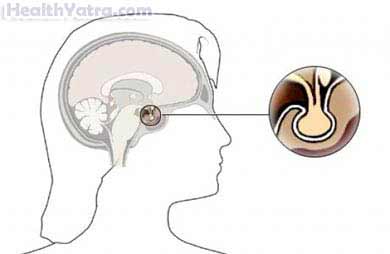Definition
Growth hormone (GH) controls the growth of soft tissue and bone. Elevated GH causes an excess of bone and soft tissue growth. In adults, this can cause a rare disorder called acromegaly. It can cause serious complications and early death if not treated.
In young children, bone fusion and growth is still occurring. Excess GH can cause a similar condition called gigantism.
Causes
The pituitary gland is a small gland located at the base of the brain. It produces many hormones, including GH.

In most cases, the elevation of GH is caused by a benign tumor of this gland. In a small number of cases, malignant tumors of other organs (pancreas, adrenal, lung) may be the source of excess GH.
Risk Factors
Risk factors that increase your chance of developing acromegaly include:
- Family history (rare)
- Age: 40-45 years old
Symptoms
Symptoms usually develop slowly over time.
In children, the bones are elongated and cause soft tissue swelling. If not treated, children can grow to a height of 7-8 feet.
Symptoms and complications in adults may include:
- Abnormally large growth and deformity of the:
- Hands (rings no longer fit)
- Feet (need a bigger size shoe)
- Face (protrusion of brow and lower jaw)
- Jaw (teeth do not line up correctly when the mouth is closed)
- Lips
- Tongue
- Carpal tunnel syndrome
- Skin changes, such as:
- Thickened, oily, and sometimes darkened skin
- Severe acne
- Excessive sweating and unpleasant body order due to enlargement of the sweat glands
- Deepening voice due to enlarged sinuses, vocal cords, and soft tissues of the throat
- Fatigue and weakness in legs and arms
- Sleep apnea
- Arthritis and other joint problems, especially in the jaw
- Hypothyroidism
- Abnormally large liver, kidneys, spleen, heart, and/or other internal organs, which can lead to:
- Diabetes
- High blood pressure
- Cardiovascular disease
- In women:
- Irregular menstrual cycles
- Galactorrhea (abnormal production of breast milk) in about 50% of cases
- In men:
- Impotence in about 50% of cases
Diagnosis
The doctor will ask about your symptoms and medical history. A physical exam will be done. Acromegaly is often not diagnosed until years after its onset.
Blood tests will be done to measure the level of:
- Insulin-like growth factor (IGF-I)
- Growth hormone releasing hormone (GHRH)
- Other pituitary hormones
A glucose tolerance test may also be given to see if the GH level drops. It will not drop in cases of acromegaly.
If these tests confirm acromegaly, the following may be done to locate the tumor that is causing the disorder:
- Head CT scan
- MRI scan
Treatment
The goals of treatment are to:
- Reduce production of GH to normal levels
- Stop and reverse the symptoms caused by excess GH
- Correct other endocrine abnormalities (thyroid, adrenal, sex organs)
- Reduce the tumor size
Treatment may include:
Surgery
The tumor that is believed to be causing acromegaly may be removed. In most cases, this is the preferred treatment. However, drug treatment is becoming more popular as the primary treatment approach.
Radiotherapy
External beams of radiation are used to shrink the tumor. It is most often used when surgery cannot be used or when medications have failed.
Medication
Drugs may be given to reduce the level of GH. These include:
- Cabergoline (Dostinex)—given orally
- Pergolide (Permax)—given orally
- Bromocriptine (Parlodel)—may be given before surgery to shrink tumor
- Octreotide (Sandostatin)—given by injections (may be the most effective medication for this condition)
- Pegvisomant —given by injections if not responding to other forms of treatment
Prevention
There are no known steps to prevent acromegaly. Early treatment will help to prevent serious complications.
Acromegaly Keratosis Treatment in India – Page Keywords:
Acromegaly Keratosis Definition, Acromegaly Keratosis Definition Causes, Acromegaly Keratosis Symptoms, Acromegaly Keratosis Treatment in India, Acromegaly Keratosis Treatment Cost in India, Acromegaly Keratosis Surgery Cost, Top Acromegaly Keratosis Treatment Hospital, Top Acromegaly Keratosis Treatment Doctor in India, Acromegaly Keratosis Meaning in Marathi, Acromegaly Keratosis Treatment Near me, Acromegaly Keratosis Complications, Travel India for Acromegaly Keratosis Treatment, Acromegaly Keratosis Treatment in Arab Countries, Acromegaly Keratosis Treatment in Bangladesh, Acromegaly Keratosis Treatment in Dhaka, Acromegaly Keratosis Meaning in Bengali, Acromegaly Keratosis Meaning in Arabic, Acromegaly Keratosis Meaning in Hindi, Acromegaly Keratosis Treatment in Bahrain, Acromegaly Keratosis Treatment in Egypt, Acromegaly Keratosis Treatment in Iraq, Acromegaly Keratosis Treatment in Jordan, Acromegaly Keratosis Treatment in Kuwait, Acromegaly Keratosis Treatment in Lebanon, Acromegaly Keratosis Treatment in Saudi Arabia, Acromegaly Keratosis Treatment in United Arab Emirates, Acromegaly Keratosis Treatment in Sudan, Acromegaly Keratosis Treatment in Tunisia, Acromegaly Keratosis Treatment in Nepal, Acromegaly Keratosis Treatment cost,
Acromegaly Keratosis Treatment Cost in India 2024
